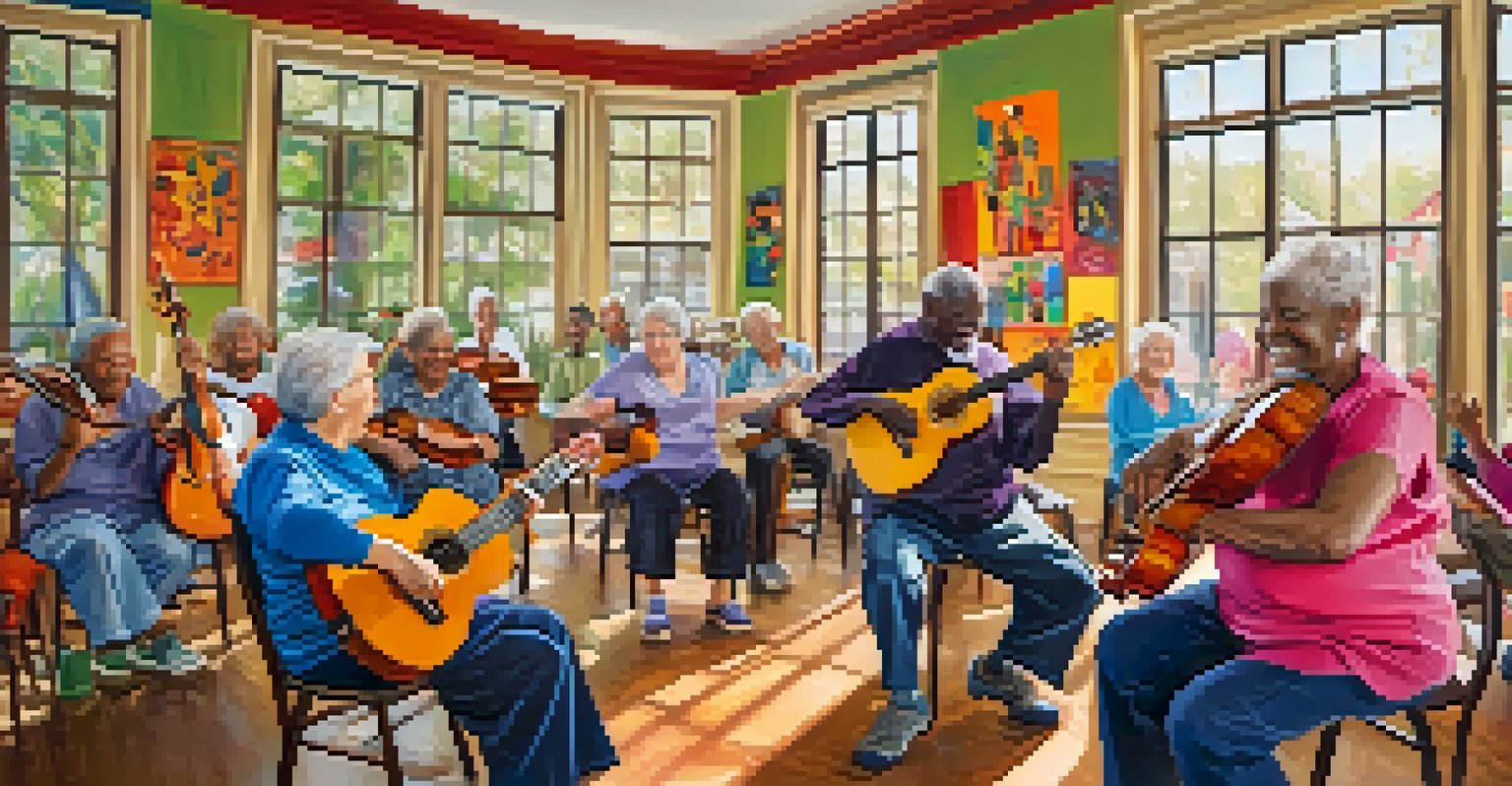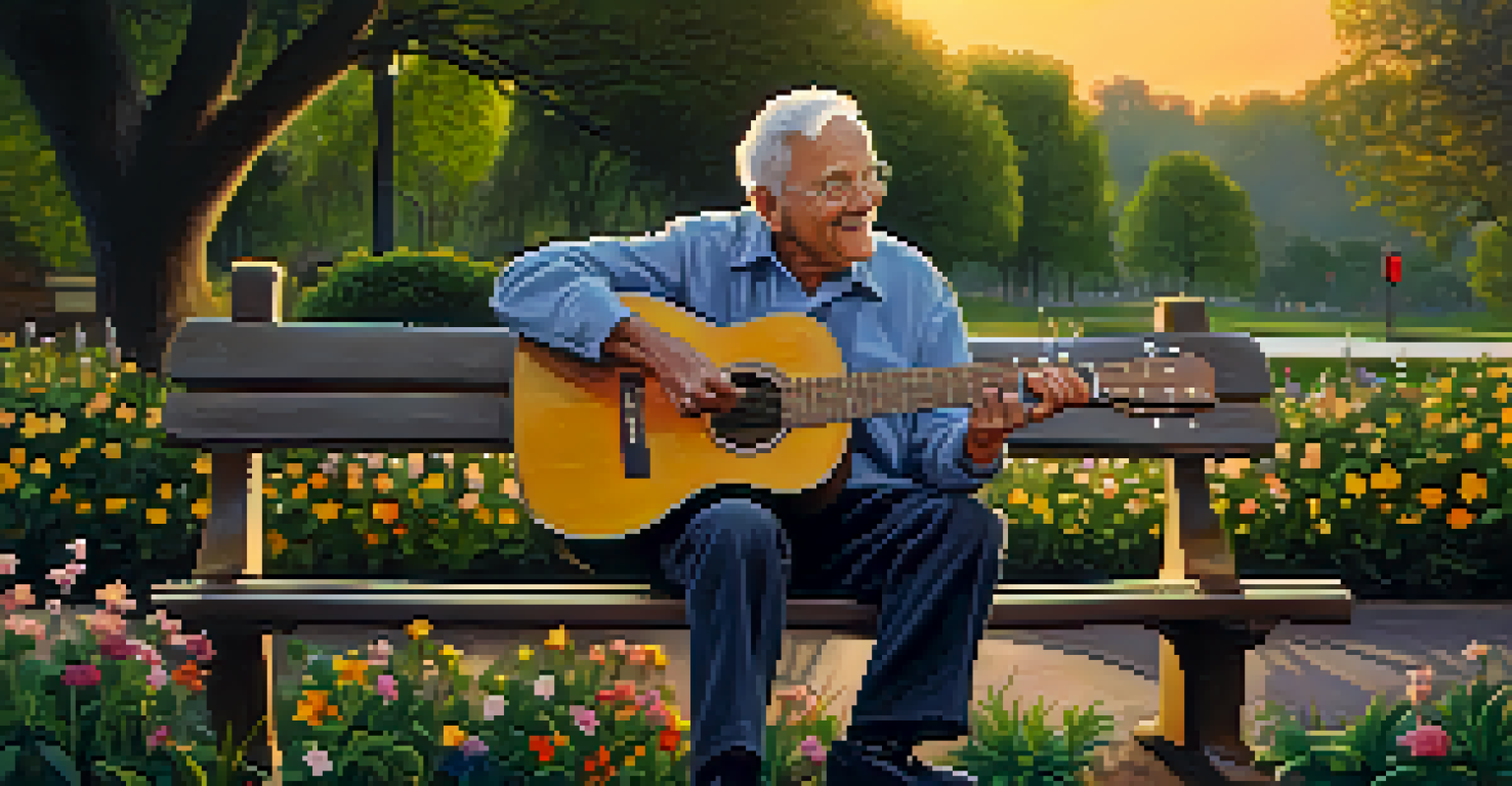The Benefits of Music Education for Older Adults

Music Education Boosts Cognitive Function in Older Adults
Engaging in music education can significantly enhance cognitive abilities in older adults. Learning to play an instrument or reading music stimulates the brain, promoting neural connectivity. Just like a workout for the mind, these activities can help improve memory, attention, and even problem-solving skills.
Music is the shorthand of emotion.
Research shows that older adults who participate in music education may experience a slower decline in cognitive functions compared to those who do not. This is particularly important as we age, as maintaining mental acuity is crucial for independence. Think of it as keeping your brain fit—just like exercising your body.
Moreover, music education can introduce new ways of thinking and learning. Whether it’s exploring music theory or mastering a new instrument, these experiences can rekindle a love for learning that might have diminished over the years.
Enhancing Emotional Well-being Through Music
Music has a profound impact on our emotions, and this is especially true for older adults. Participating in music education can help express feelings and reduce anxiety or depression. It's like having a trusted friend who understands your emotions without needing words.

Moreover, the act of making music—whether playing an instrument or singing—can release endorphins, the 'feel-good' hormones. This natural high can lead to improved mood and overall emotional health. Imagine the joy of strumming a guitar or joining a choir; these activities can uplift spirits and promote a sense of belonging.
Music Boosts Cognitive Function
Engaging in music education enhances cognitive abilities in older adults, promoting better memory and attention.
Additionally, music can evoke memories and feelings of nostalgia, further enhancing emotional well-being. This connection to the past can be comforting and provide a sense of identity, making music education a powerful tool for emotional healing.
Fostering Social Connections Through Music
One of the most beautiful aspects of music education is its ability to bring people together. Group classes or ensembles provide opportunities for older adults to connect with peers, fostering friendships and social interaction. Think of it as a musical community that thrives on collaboration and shared experiences.
The beautiful thing about learning is that no one can take it away from you.
These social connections are vital for mental health, combating feelings of loneliness that can often accompany aging. Participating in music education creates a sense of belonging, as individuals bond over shared interests and experiences in music. Sharing in the joy of performance can enhance these relationships even further.
Additionally, these social gatherings often lead to increased motivation for participation. Knowing that others are counting on you can encourage individuals to practice and improve, creating a supportive environment that nurtures growth.
Promoting Physical Coordination and Motor Skills
Learning to play an instrument or participate in music education involves physical activity, which is beneficial for older adults. Activities like drumming or playing the piano require fine motor skills and hand-eye coordination. Engaging these skills can lead to improved dexterity and overall physical health.
Moreover, music education often encourages movement, whether through dance or rhythmic exercises. This physical engagement can help enhance balance and coordination, reducing the risk of falls, which is a significant concern for older adults. Picture a lively class where everyone is dancing to the beat—it's not just fun; it’s also a great workout.
Music Enhances Emotional Well-being
Participating in music education helps express emotions and reduces anxiety, leading to improved mood and emotional health.
Ultimately, these physical benefits contribute to a greater quality of life. By keeping the body active and engaged through music, older adults can enjoy improved mobility and flexibility, enhancing their overall well-being.
Encouraging Lifelong Learning and Personal Growth
Music education is a gateway to lifelong learning, encouraging older adults to continuously explore new skills and interests. Whether it’s mastering a new instrument or delving into music theory, there’s always something new to discover. This pursuit of knowledge can be incredibly fulfilling and invigorating.
Additionally, overcoming challenges associated with learning music fosters resilience and determination. Each new chord or song learned can boost self-esteem and instill a sense of accomplishment. Imagine the pride in finally playing your favorite tune flawlessly—it's a testament to hard work and dedication.
Engaging in music education can also inspire creativity, allowing older adults to express themselves in unique ways. This creative outlet can be liberating and can lead to personal growth and self-discovery, proving that it’s never too late to learn something new.
Enhancing Memory and Recall Through Music
Music is known to have a strong link to memory, making it a powerful tool for older adults. Engaging in music education can help improve memory recall, whether through learning lyrics, melodies, or rhythms. It’s like creating a mental map that makes it easier to navigate memories.
Furthermore, music can serve as a mnemonic device, making it easier to remember information. For example, many people recall their childhood songs effortlessly, demonstrating how music can anchor memories. This can be especially beneficial for older adults who may struggle with memory retention.
Fosters Social Connections
Music education creates opportunities for older adults to connect with peers, fostering friendships and a sense of belonging.
Incorporating music into daily routines can also aid in memory improvement. For instance, listening to familiar tunes can evoke memories and stimulate brain activity. It’s a simple yet effective way to keep the mind engaged and active.
Boosting Confidence Through Musical Performance
Participating in music education often culminates in performance opportunities, which can significantly boost confidence in older adults. The experience of performing—whether in front of friends or a larger audience—can be incredibly empowering. It’s akin to stepping onto a stage and feeling the rush of excitement and accomplishment.
Moreover, overcoming the nerves that come with performing can lead to personal growth and increased self-esteem. Each performance is a chance to showcase hard work and dedication, reinforcing a positive self-image. Just like a proud parent watching their child graduate, the pride in one’s musical achievements can be deeply fulfilling.

Additionally, the supportive atmosphere of music education encourages a safe space for experimentation and growth. Mistakes are part of the learning process, and this understanding fosters a culture of encouragement, allowing confidence to flourish in a nurturing environment.
Creating a Sense of Purpose and Fulfillment
Engaging in music education can provide older adults with a renewed sense of purpose. Learning to play an instrument or participating in musical activities can fill time with meaning and joy. It’s like finding a new passion that invigorates daily life and brings excitement to routine.
This sense of fulfillment is crucial as individuals navigate the changes that come with aging. Music education can serve as a reminder that life is full of opportunities for growth and enjoyment. Just imagine the joy of sharing music with others—it's a gift that keeps on giving.
Moreover, achieving musical goals can create a profound sense of accomplishment. Whether it's mastering a new piece or performing for an audience, these experiences can contribute to overall life satisfaction, reminding older adults that they can still pursue their passions.